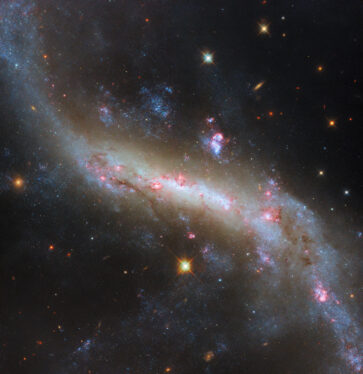2 min read
Hubble Examines a Barred Spiral’s Light
This NASA/ESA Hubble Space Telescope image features the barred spiral galaxy NGC 3059, which lies about 57 million light-years from Earth. Hubble’s Wide Field Camera 3 collected the data in May 2024 as part of an observing program that studied a number of galaxies. All of the observations used the same range of filters: partially transparent materials that allow only very specific wavelengths of light to pass through.
Astronomers use filters extensively in their observations. These filters may allow either extremely narrow or somewhat broader ranges of light through to the telescope’s instruments. Narrow-band filters are invaluable from a scientific perspective because they filter specific wavelengths of light that are associated with specific physical and chemical processes. For example, under certain conditions, hydrogen atoms emit red light with a wavelength value of 656.46 nanometers called H-alpha emission, or the ‘H-alpha line’. It is very useful to astronomers because its presence indicates certain physical processes and conditions and is often a tell-tale sign of newly forming stars.
The data in this image used a narrow-band filter that allowed H-alpha emission through to the telescope’s detectors. The particular filter, called F657N (F for filter, N for narrow, and 657 for the wavelength in nanometers) or the H-alpha filter, lets through light very close to the 656.46 nanometer H-alpha line’s wavelength. It reveals pinkish star-forming regions in the galaxy.
Data from five other wide-band filters also contributed to this image. As their name implies, wide-band filters allow a wider range of wavelengths through to Hubble’s instruments. They isolate sections of the electromagnetic spectrum allowing astronomers to explore different aspects of the object Hubble is looking at.
In the case of this image, wide-band filters revealed the bluish patches that hold older stars. In addition, information from multiple filters provides image processors with the data to make beautiful and informative images such as this one.
Text Credit: European Space Agency (ESA)
Explore More
Media Contact:
Claire Andreoli
NASA’s Goddard Space Flight Center, Greenbelt, MD
claire.andreoli@nasa.gov
https://science.nasa.gov/missions/hubble/hubble-examines-a-barred-spirals-light/










